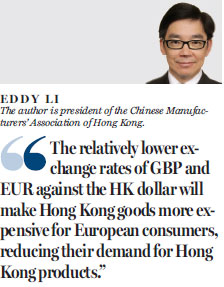Hong Kong not exempt from global shock waves of Brexit
Updated: 2016-07-07 08:03
By Eddy Li(HK Edition)
|
|||||||
In last month's UK referendum on European Union membership, the "Remain" camp lost to the "Leave" camp by a margin of 3.8 percent. Brexit is now official. After the results of the plebiscite were released, British Prime Minister David Cameron announced he would resign as PM in October. The exchange rate of the British pound and global stock markets dropped dramatically in response to the news.
There was a time when Britain had an empire on which the sun never set, with colonies all over the world. But the international standing of the United Kingdom has gradually declined ever since, and after the vote made on Brexit, the country is now facing a crisis of unity - with voices from Scotland, Northern Ireland, and even the capital London demanding independence.
The aftermath of Brexit cannot be predicted precisely, and the impact on Britain, the EU and even the globe will appear gradually. Germany's Foreign Ministry described June 24, 2016 as a "sad day for Europe". It is hard to say whether Brexit is the first of the many dominos which will fall and finally lead to the break-up of the EU. According to related provisions, the members will have to follow specific procedures to actually leave the EU. There will be two years of deliberating for the UK to negotiate with the EU over trade, tariffs, immigrants and so on. One thing we can say is that things will not be quiet for at least two years.

Hong Kong is by no means exempt from being affected by the impact of Brexit. A review of Hong Kong's stock market recently shows the Hang Seng Index (HSI) climbed ahead of the referendum when people were optimistic about Britain's staying in EU. The final outcome, however, caused the HSI to fall by as much as 1,200 points, reflecting investors' concerns about Brexit.
The immediate concern of Hong Kong's enterprises is the depreciation of the pound (GBP). It's highly possible that the exchange rate of Euro (EUR) against the US dollar will drop as well. The relatively lower exchange rates of GBP and EUR against the HK dollar will make Hong Kong goods more expensive for European consumers, reducing their demand for Hong Kong products, and eventually hurting Hong Kong's export trade. Europe, including the UK, has always been a major export market for Hong Kong, with the EU taking up $43 billion (12 percent) and the UK accounting for $7 billion (2 percent) of all exports from Hong Kong. The split of the EU and UK will definitely impact on our export trade.
There is another problem: Due to historical factors, Hong Kong is more closely connected with the UK than with any other foreign countries, and therefore many Hong Kong enterprises had chosen Britain to set up their regional headquarters. They found it easier to deal with European businesses in the UK - an EU member as well as a country that shares much common ground with Hong Kong. Take the export of Hong Kong watches as an example. The European market occupies about 20 percent of the clocks and watches exported from Hong Kong and the goods are basically concentrated in and then distributed from England to other European countries. This was supposed to be the strong point for Hong Kong enterprises in developing the European market, but Brexit has sparked considerable concern about whether this advantage will still be available in the future. If not, lots of Hong Kong companies will have to deal with many complicated procedures.
In the wake of this, the government should pay close attention to developments in the Europe, and discuss this with the business sector soon. Hong Kong's response, including how to participate more actively in the Belt and Road Initiative and how to tap into emerging markets in the Middle East, Mid-Asia and Southeast Asia, will aim to make up for the likely loss of business in the European market.
(HK Edition 07/07/2016 page1)